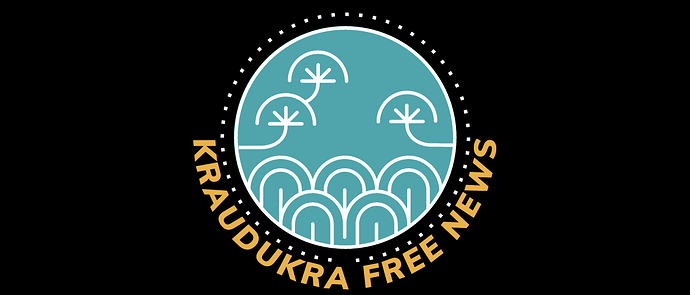Krauanagaz State Dept. Warns of ‘Unintended Consequences’ in Accepting Izaakian AI Program
The Krauanagazan State Department has raised alarms over the international adoption of Izaakia’s “Dr. MIA” AI-driven healthcare program, citing potential security risks amid unresolved suspicions surrounding Izaakia’s involvement in the Veridyan container ship explosion. Krauanagazan officials warn that the program, while framed as humanitarian, could grant Izaakia backdoor access to sensitive data, allowing for possible data collection or cyber manipulation. These concerns, coupled with broader geopolitical tensions in the Gulf of Good Omen, have intensified international scrutiny of Izaakia’s expanding role in critical sectors like healthcare. Izaakia has denied the assertion, and labeled Krauanagaz’s claims as “baseless.”
Veridyan, Krauanagaz— The Krauanagazan State Department has issued a stark warning to the international community regarding the potential risks of adopting the Izaakian “Dr. MIA” (Medical Intelligence Automation) program. This comes in the wake of growing suspicions surrounding Izaakian involvement in the catastrophic explosion of a hijacked container ship earlier this year near the Pohnarrasi port town of Veridyan.
The Izaakian Aid Agency recently announced the global rollout of its advanced Dr. MIA program. A program Izaakia says they plan to deploy in addressing medical shortages in developing nations by providing AI-driven healthcare services. However, Krauanagaz’s State Department has raised concerns that the implementation of the program could pose security risks, particularly in light of Izaakia’s recent alleged activities in the Gulf of Good Omen.
“We are not questioning the potential benefits of AI technology in healthcare. What we are doing is warning against are the unintended consequences that may arise from allowing a foreign government— particularly one facing tangible espionage allegations— to embed its artificial intelligence infrastructure within national healthcare systems," said Darius Korin, Krauanagaz’s Secretary of State. “When it comes to accepting such critical systems from a government accused of orchestrating covert operations, we must weigh the risks carefully. Programs like Dr. MIA very well could come with strings attached. It could open a pathway to easy data collection and potentially covert intelligence activities.”
This sharp critique appears to be rooted in lingering suspicion over Izaakia’s involvement in the Pohnarrasi container ship explosion, a catastrophic event that killed dozens and disrupted critical counter-terrorism operations. Leaked documents from Krauanagaz’s Federal Police Agency (FPA) and Naval Criminal Investigative Service (NCIS) suggest that Izaakian intelligence operatives may have been involved in orchestrating the explosion, possibly as part of a false-flag operation. Although no conclusive evidence has emerged, the allegations have deepened the distrust between Krauanagaz and Izaakia, fueling concerns about the latter’s broader geopolitical aims.
Several Krauanagazan officials have speculated that the AI system could grant Izaakia a covert means of gathering sensitive data from participating nations under the guise of healthcare aid. Magistrate Lurik Taarek, a prominent lawmaker and one of Izaakia’s most vocal critics in Krauanagaz, reiterated his concerns about accepting such technology in light of recent events.
“Izaakia’s denial of their involvement in the Veridyan explosion does not align with the evidence that has emerged from our investigations,” Taarek told reporters. “Given this, should we really believe that their AI systems, no matter how benevolent they appear, are solely for healthcare? The risks of data breaches, manipulation, or even backdoor cyber operations are real. We cannot afford to be naïve.”
Krauanagaz is urging caution to any nation considering the adoption of Izaakia’s Dr. MIA AI program. Secretary Korin emphasized that while the program appears to be focused on humanitarian efforts, there is a potential for misuse or exploitation of sensitive data, particularly given Izaakia’s alleged intelligence apparatus— on September 1 the Izaakian minister of defense, Ekaterina Künning stated that, “[Izaakia does not] have an intelligence agency.”
“There is a real risk that such technology could be used for purposes other than healthcare,” Korin warned. “We have seen how Izaakia has allegedly manipulated regional dynamics to its advantage. Allowing them access to the inner workings of our health systems could be inviting an unseen form of influence or control.”
In response to Krauanagaz’s cautionary stance, the Izaakian government has defended its AI rollout. A spokesperson for the Izaakian Aid Agency called the accusations “baseless” and reaffirmed that the Dr MIA initiative is “purely humanitarian, designed to save lives and build healthier futures for vulnerable populations.” The spokesperson also accused Krauanagaz of leveraging the Pohnarrasi incident to “sow distrust and undermine legitimate efforts at global health advancement.”
Despite these assurances, the timing of the AI program’s rollout— just weeks after the explosive allegations regarding Izaakian operatives— has raised alarms in various international circles. Several geopolitical analysts have suggested that Krauanagaz’s warning may carry enough weight to influence regional powers and developing nations, particularly those wary of entangling themselves in the larger power struggles of the Gulf of Good Omen.
“The real question here is whether nations in need of healthcare support will heed Krauanagaz’s advice or gamble on the benefits of the AI technology,” said Nyra Jorek, an expert in international cybersecurity. “The risks are real, but so are the potential rewards. It’s a balancing act.”
As the investigation into the Veridyan explosion continues, Krauanagaz’s warning reflects a deepening mistrust surrounding Izaakia’s international initiatives. For now, the global community watches closely, considering the potential implications of Izaakia’s expanding presence in critical sectors.
